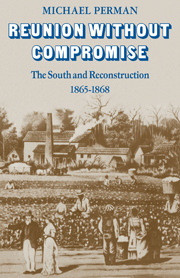Book contents
- Frontmatter
- Contents
- Preface
- Part I Conciliation and conflict
- Part 2 Encouraging Southern loyalty, 1865
- Part 3 Seeking Southern cooperation, 1866
- Part 4 Demanding Southern acquiescence, 1867–1868
- 9 Reconstruction enjoined – March to July 1867
- 10 Reconstruction resisted – July to December 1867
- Epilogue: The irrelevance of the moderates, 1865–1868
- Appendix: Registration and voting statistics for the Southern State Constitutional Conventions, 1867–8
- A note on sources
- Index
10 - Reconstruction resisted – July to December 1867
Published online by Cambridge University Press: 05 August 2012
- Frontmatter
- Contents
- Preface
- Part I Conciliation and conflict
- Part 2 Encouraging Southern loyalty, 1865
- Part 3 Seeking Southern cooperation, 1866
- Part 4 Demanding Southern acquiescence, 1867–1868
- 9 Reconstruction enjoined – March to July 1867
- 10 Reconstruction resisted – July to December 1867
- Epilogue: The irrelevance of the moderates, 1865–1868
- Appendix: Registration and voting statistics for the Southern State Constitutional Conventions, 1867–8
- A note on sources
- Index
Summary
Non-cooperation
Doubts about the possibility or desirability of reconstructing under the Congressional Acts were accumulating during late June and July. Commanders noticed this. General Wager Swayne told Chase on 28 June that ‘there seems to be a growing feeling against a [constitutional] convention … Our [Republican nominating] convention was an eminent success, and so far there is no appearance of opposing organizations. What we have most to fear is ‘No Convention.”’ A political vacuum was emerging in the South. Conservative whites sensing the unacceptability of the restrictions and demands involved in cooperation were beginning to disengage from reconstruction and instead to adopt a posture which was passive and uninvolved. ‘No Convention,’ as proposed since April by Benjamin Perry, came, therefore, to be the course generally advocated and the one best suited to the Southern white disposition. Before the July Act was even on the statute books, Sheridan was telling Grant, ‘I see a slight tendency on part of politicians to go against Convention and reconstruction. Mississippi is strongly that way. Texas is beginning to look that way and Georgia also. They will have no success in Louisiana.’
That reconstruction was at a crucial stage was also realized by Sickles, who was commanding in the Carolinas. He believed that the manifest disinclination of the whites to cooperate had to be corrected by encouragement. ‘A more liberal amnesty,’ he told Lyman Trumbul, ‘is, in my judgement, essential to the success of the Congressional plan of reconstruction.’
- Type
- Chapter
- Information
- Reunion Without CompromiseThe South and Reconstruction: 1865–1868, pp. 304 - 336Publisher: Cambridge University PressPrint publication year: 1973

